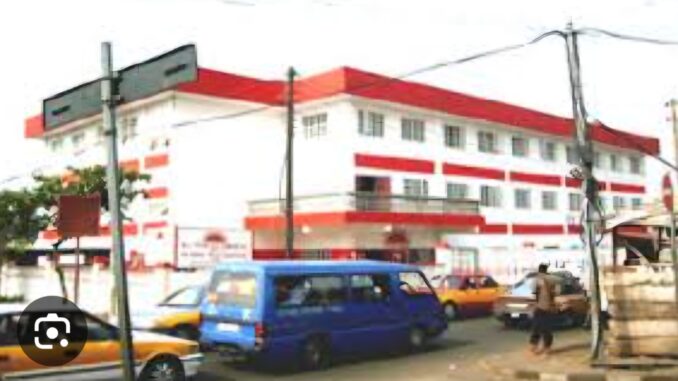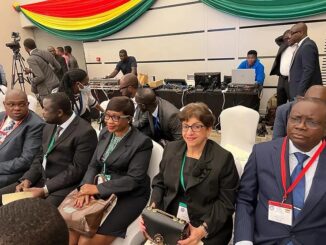
The Crumbling House: APC’s Internal Chaos and the Systematic Marginalization of Political Pluralism in Sierra Leone
By Alpha Amadu Jalloh
In any functioning democracy, opposition parties serve as the counterweight to power. They are the necessary check that ensures the ruling government does not overreach, abuse authority, or govern with impunity. But in Sierra Leone today, the opposition All People’s Congress (APC), once a mighty political force, has become a fractured, rudderless ship sailing toward irrelevance. Worse yet, this collapse is not occurring in isolation. It is happening amid a broader political landscape where the ruling Sierra Leone People’s Party (SLPP) has monopolized the machinery of governance. From Parliament to the judiciary and even into cultural institutions, the SLPP is marginalizing all other voices, silencing dissent, and eroding the essence of multiparty democracy. What we are witnessing is not simply a political crisis. It is a national democratic emergency.
The APC’s current trajectory is the culmination of internal betrayal, strategic ineptitude, and a leadership structure that appears compromised at its core. Since the controversial 2023 elections, where widespread irregularities and disputes erupted over the results, the APC has failed to galvanize itself into a coherent opposition force. Instead of leveraging popular discontent and international criticism to demand transparency and electoral justice, the party caved in. The most shocking betrayal came in the form of the so-called “cross-party agreement” brokered in October 2023 under international supervision. This pact was intended to stabilize the country. In reality, it solidified the SLPP’s grip on power while defanging the APC. The agreement saw the APC returning to Parliament and local councils without achieving any substantial concessions. There was no electoral audit. No retraction of skewed results. No justice for voters disenfranchised or brutalized. In essence, the APC leadership handed President Bio legitimacy on a silver platter.
Chairman Minkailu Mansaray, who now acts more like an SLPP surrogate than a loyal APC steward, has failed to rally the party base or provide strategic direction. His repeated public statements urge calm, cooperation, and “constructive opposition.” These are euphemisms for surrender. His silence on pressing national issues, from judicial bias to cultural encroachment, speaks volumes. Mansaray has become the embodiment of a co-opted opposition figure. He appears more concerned with appeasing the State House than confronting it. His role in the party’s leadership has become synonymous with political passivity, allowing the APC to drift into irrelevance while pretending to offer oversight.
There is also a troubling disconnect between the APC leadership and its grassroots. The ordinary party supporter, especially in northern strongholds and urban centers like Freetown, feels abandoned. These supporters fought, protested, and voted amid violence and intimidation only to see their leaders capitulate without negotiation. Many feel the party has been hijacked by elites more concerned with survival than with principle. There have been internal calls for a convention to restructure leadership and reinstate a spirit of resistance, but Mansaray and his allies appear determined to suppress dissent. This disconnect between top, and base is growing by the day, weakening any future electoral prospects the party might have.
While the APC implodes, the SLPP under President Julius Maada Bio continues to weaponize state institutions against all dissent. Let us examine the systematic marginalization of other political actors and the entrenchment of a single-party state under the guise of democracy. In the House of Parliament, the ruling party dominates not only by numerical superiority but by procedural manipulation. Speaker of Parliament Hon. Abass Bundu, once regarded as a respected elder statesman, has turned the legislature into an SLPP echo chamber. When the APC eventually returned to Parliament after months of boycott, it was under terms dictated by the SLPP. Key oversight committees were denied to them. Debates are often curtailed. Motions from opposition members are routinely blocked or ridiculed. The recent passage of the 2024 National Budget, with little to no consideration for opposition input, demonstrated the farce of democratic deliberation. The opposition bench has been reduced to mere spectators in the lawmaking process.
Parliamentary immunity has also come under attack. This was seen in the targeted intimidation of MPs like Hon. Mohamed Bangura and Hon. Lahai Marah, who dared to challenge the regime’s overreach. Security forces have followed opposition MPs, intercepted their communications, and even harassed their families. The atmosphere in Parliament is one of coercion and fear. The majority of MPs now operate as rubber stamps for executive decisions, not as representatives of the people. Genuine legislative debate is rare and discouraged. Political polarization has left the nation’s highest lawmaking body compromised and barely functional.
The judiciary, once a beacon of hope, has now become another arm of the ruling party. Cases involving political prisoners, human rights activists, or journalists are delayed, dismissed, or distorted. The most glaring example remains the continued incarceration of opposition members and civil society figures under flimsy charges of incitement or cybercrime. These are charges that would not hold in a genuinely independent court. Take, for instance, the case of Dr. Richard Konteh, a former APC flagbearer aspirant and minister, who faced years of harassment, travel bans, and investigations without resolution. Consider also the fate of lesser-known political detainees from the August 10, 2022, protests. Some of them have vanished from public records. Others languish in prison without trial. Meanwhile, state-aligned individuals accused of embezzlement or abuse walk free. They are even celebrated under banners such as “Hands Off Our Girls” and “Feed Salone.” The Anti-Corruption Commission (ACC), led by Ben Kaifala, has become a tool for selective prosecution. It hounds opposition members while turning a blind eye to the ruling elite’s extravagance.
Even Sierra Leone’s cultural and religious institutions have not been spared. The state has infiltrated every space. It has co-opted traditional leaders and religious figures into political cheerleaders. The Supreme Islamic Council, the Inter-Religious Council, and the Council of Paramount Chiefs have all been strategically manipulated to endorse state policies or remain silent in the face of injustice. Recently, the National Council for Civic Education and Development (NaCCED), originally designed to promote national unity and civic responsibility, has become a propaganda arm. Events are themed around glorifying President Bio’s achievements, often omitting the voices of other political traditions or civil society actors. National heroes’ days, military celebrations, and cultural pageants have been sanitized of critical reflection. They have become platforms for SLPP dominance.
The crisis extends beyond the APC. Other registered political parties; NGC, C4C, UDM, PDP; are mere shadows of their former selves. They have been sidelined in national discourse. Their leaders have either been intimidated into silence or absorbed into SLPP patronage structures. Dr. Kandeh Yumkella, the once-fiery leader of the NGC, has been effectively neutralized through appointment and proximity to power. The NGC as a viable force is no more. The Coalition for Change (C4C), led by former Vice President Sam-Sumana, has lost its Kono stronghold through political sabotage and bribery. The Political Parties Regulation Commission (PPRC), which should serve as the impartial arbiter of political conduct, now acts as a gatekeeper for SLPP dominance.
Regulations are selectively enforced. Smaller parties find themselves bogged down in bureaucracy while the ruling party operates with impunity.
The ordinary citizen bears the brunt of this political dysfunction. Disillusioned with both the APC and SLPP, many Sierra Leoneans feel politically homeless. The youth, in particular, have grown apathetic or rebellious. This has fueled an underground culture of protest, satire, and digital resistance. But this rage has no formal outlet. The opposition offers no vision, no mobilization, and no moral leadership. Civil society, once robust, is fragmented. Journalists work under the looming threat of arrest. Diasporans, whose remittances sustain the economy, remain politically disenfranchised under archaic laws that treat dual citizens as second-class patriots. The very people sustaining the economy through billions in remittances are barred from leading their country politically. This contradiction is not only unjust. It is unsustainable.
The APC must decide. It must cleanse itself of compromised leadership, restructure its grassroots engagement, and reclaim its role as a champion of the people. It must organize not just for elections but for resistance, reform, and renewal. This also means aligning with other marginalized parties and civil society groups to form a genuine opposition coalition. The lesson from other struggling democracies is clear. Divided opposition equals perpetual dictatorship. The people of Sierra Leone deserve a functioning opposition, not a complicated one. They deserve justice, not vendetta courts. They deserve a Parliament that debates, not one that dictates. Above all, they deserve a democracy where all voices, not just those in power, can be heard.
Until then, Sierra Leone remains not a multi-party democracy but a one-party state in disguise. That is the greatest betrayal of all.
Alpha Amadu Jalloh is a writer and political commentator. He writes frequently on governance, democracy, and human rights in Sierra Leone.



Leave a Reply